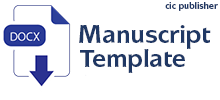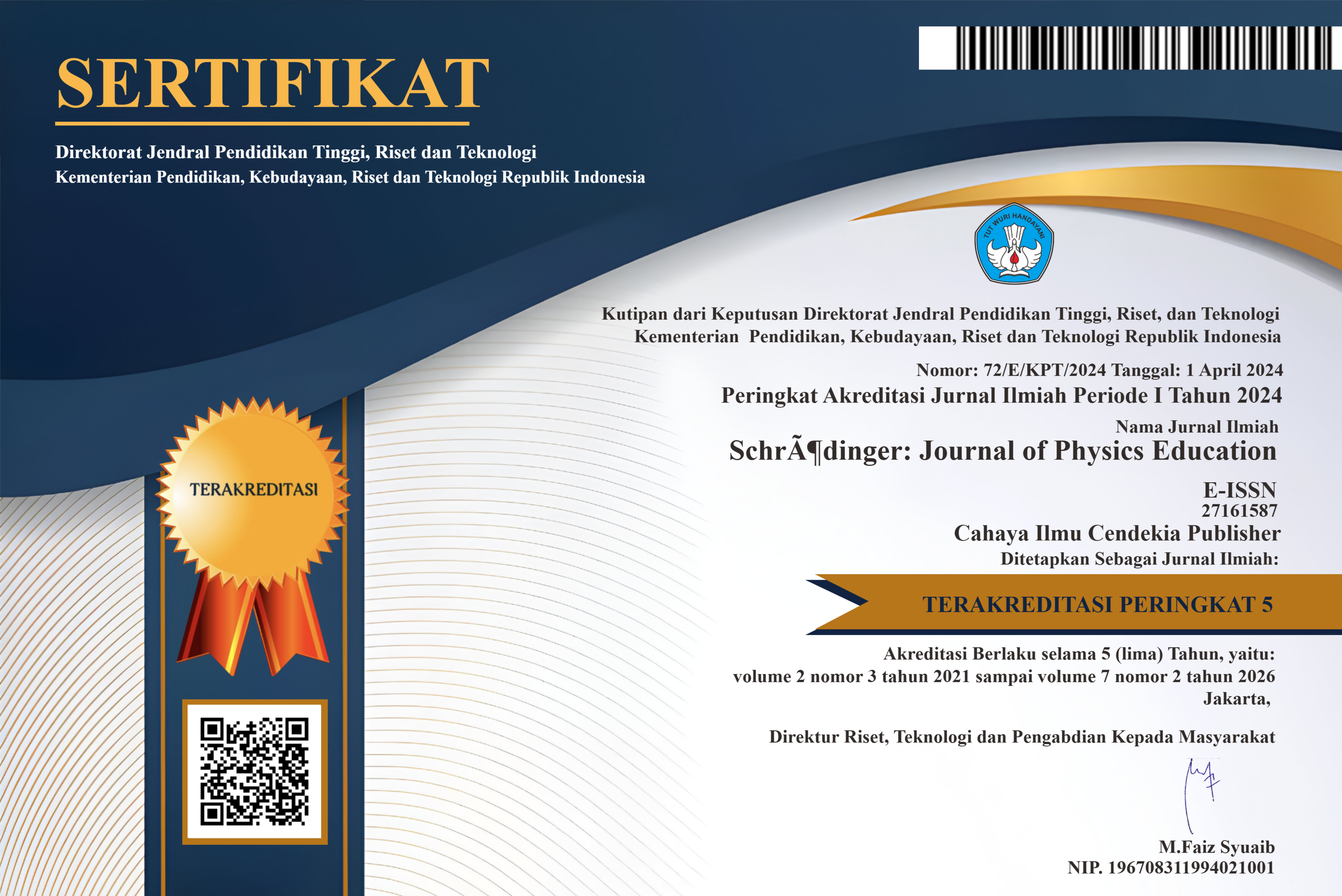Contextual Learning Approach: Development of Worksheet in Physics Subjects
Abstract
Research Objectives: The purpose of this study was to develop worksheets using a contextual learning approach in learning physics subject to elasticity and Hooke's law.
Methodology: This research includes research and development or Research and Development, Dick and Carey (2009) the steps are (1) Analysis of learning objectives; (2) Learning analysis; (3) Analysis of students and their environment; (4) formulate specific objectives; (5) Development of assessment instruments; (6) Development of learning strategies; (7) Develop and select learning materials; (8) Formative evaluation; (9) Revision; (10) Summative evaluation, but the authors limit it to the ninth step.
Main Findings: The results of this study are worksheets using the contextual learning approach to learning the physics of elasticity and Hooke's law which have been declared feasible by the validator. Based on the results obtained, it can be concluded that worksheets using the contextual learning approach in learning elastic physics and Hooke's law are well used as teaching materials for students in class X SMA/MA.
Novelty/Originality of Research: Integrating the values of everyday life is important to be integrated into learning, therefore, teachers are required to create learning innovations, such as worksheets based on everyday life.
References
Jati, B. M. E. Pengantar Fisika 1. Yogyakarta: Gadjah Mada University Press, 2013.
Giancoli, D. C. Physics: Principles with Applications. United States of America: Pearson. 2013.
Bao, L., & Koenig, K. (2019). Physics education research for 21st century learning. Disciplinary and Interdisciplinary Science Education Research, 1(1), 1-12.
Darmaji, D., Kurniawan, D. A., & Irdianti, I. (2019). Physics Education Students' Science Process Skills. International Journal of Evaluation and Research in Education, 8(2), 293-298.
Springuel, R. P., Wittmann, M. C., & Thompson, J. R. (2019). Reconsidering the encoding of data in physics education research. Physical Review Physics Education Research, 15(2), 020103.
Hernawan, Assep Herry, Pengembangan Bahan Ajar. Bandung: UPI, 2010.
Prastowo, Andi. Panduan Kreatif Membuat Bahan Ajar Inovatif. Yogyakarta: Diva Pers, 2011.
Belawati, T., Sadjati, I.M., Andayani.., Julaeha, S., Pannen, P. Pengembangan Bahan Ajar. Jakarta: Universitas Terbuka. 2007.
Sanjaya, Strategi Pembelajaran berorientasi Standar Proses Pendidikan. Jakarta: Kencana Prenada Media Group, 2006.
M. Masnur. KTSP Pembelajaran Berbasis Kompetensi dan Kontekstual. Jakarta: Bumi Aksara, 2011.
Tantri, Pengembangan Perangkat Pembelajaran Berbasis Kontekstual Pokok Bahasan Turunan di Madrasah Aliyah Negri 3 Palembang. Jurnal Pendidikan Matematika, vol. 3, no. 1, pp.7-14,2009.
Suprijono, Agus. Cooperative Learning Teori Dan Aplikasi PAIKEM. Yogyakarta: Pustaka Belajar, 2013.
Fitriyati. Pengembangan LKS Fisika SMA Kelas X Semester II dengan Website Online Berbasis Contextual Teaching Learning. Jurnal Pendidikan FKIP UMP. Purworejo: UMP. 2013.
Setyosari, Punaji. Metode Penelitian Pendidikan dan Pengembangan Ed. 2. Jakarta: Kencana Prenada Media Group, 2012.
Dick, W., Carey, L., Carey. J. O. The Systematic Desaign Of Instruction. Ohio: Pearson, 2009.
S. Arikunto. Dasar-dasar Evaluasi Pendidikan (Revisi).Jakarta: Bumi Aksara, 2010
Sugiyono. Metode Penelitian Pendidikan Pendekatan Kuantitatif,Kualitatif, dan R&D. Bandung: Alfabeta, 2013.
Copyright (c) 2023 Wike Tio Wulandari

This work is licensed under a Creative Commons Attribution-NonCommercial 4.0 International License.
Authors who publish with this journal agree to the following terms:
- Authors retain copyright and acknowledge that the Schrödinger: Journal of Physics Education is the first publisher licensed under a Creative Commons Attribution 4.0 International License.
- Authors are able to enter into separate, additional contractual arrangements for the non-exclusive distribution of the journal's published version of the work (e.g., post it to an institutional repository or publish it in a book), with an acknowledgment of its initial publication in this journal.
- Authors are permitted and encouraged to post their work online (e.g., in institutional repositories or on their website) prior to and during the submission process, as it can lead to productive exchanges and earlier and greater citation of published work.






.png)
.png)








.png)
.png)
.png)







